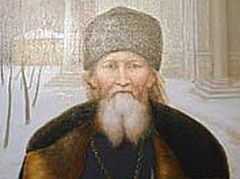The Apostle says, But God forbid that I should glory, save in the cross of our Lord Jesus Christ… Then he pronounces these words of great power and importance: by whom the world is crucified unto me, and I unto the world (Gal. 6:14).
What do these words of the apostle mean? They mean only one thing—that the cross is placed upon the whole world as a kind of measuring-stick of Divine righteousness and Divine truth… More than anything in life, people need a measuring-stick, some criteria they can use to measure everything around them—the thoughts that come to them, the flood of information, the words of politicians and ordinary people, the actions of these or those other people…
Modern philosophy, and the pervasive view of life that comes from this dangerous philosophy, asserts that man is truth unto himself, that there are as many truths as there are heads and minds. What is good is what is good for me, and I don’t care if it is good for anyone else.
As if foreseeing these terrible temptations of our times, the Apostle Paul says these penetrating words about the Cross by which the world is crucified; about the Cross on which appeared the fathomless, boundless, all-encompassing, absolute Divine truth…
And what is this truth, what is this absolute truth? God suffers out of love for people. If God does this, if He accepts suffering in the flesh of His Son, then this is the most important, the most fundamental thing—everything revolves around this truth. Truth consists in the fact that love is the main thing in life. Everything else is secondary. That is why the commandment about love is the main commandment of Christianity; that is why the Lord pronounces this commandment not only in word, but by the ascetic labor of His life. At the same time, He shows people that love is always accompanied by sacrifice. In a certain sense, love becomes synonymous with sacrifice, and sacrifice synonymous with love, because if in loving another we are not willing to do anything for him—that is not love…
If anything consolidates society it is that feeling of solidarity, and solidarity always presupposes the ability of one person to serve another, the ability of one person to give something to another, and in extreme situations, to give his life for his neighbors (cf. Jn. 15:13)…
There is no other path for the human race, no other path to happiness and the fullness of life, than this path that Christ has shown to us. There is no other law of human relationship other than the law of love, which presupposes the giving of yourself to another person, and to receive in response the great gift of love from the one to whom you give yourself…
From a sermon after the Liturgy in the Theophany Cathedral, Tomsk
September 22, 2013
The best preaching of the Gospel is the witness of your own life
The best preaching of the Gospel is the witness of your own life; a righteous, pious, God-fearing life, filled with fervent and active love for Christ and neighbor. While the “teachers’ lengthy and embellished speech often remains without result,” the good works of love speak louder than the prettiest words, and are able to awaken in people the spark of trust, the desire to emulate and follow such a person (see: St. Gregory of Nyssa. Homily on his ordination)…
The apostles lived and followed Christ in pagan surroundings; they warred with idolatry, with various superstitions, with immorality. Undoubtedly, the reality of modern life appears outwardly different from that of apostolic times. But the inner content of people’s lives can differ little from what reigned in human minds and hearts during the era when the Lord’s disciples preached; and in many instances, modern life, from the point of view of salvation, is even more dangerous than that of the ancient pagans.
From a sermon given at the bestowal of the hierarchical staff
to His Grace Germogen (Serom),
Bishop of Michurinsk and Morshansk,
in the Moscow Church of St. Nicholas in Pyzhy, Moscow
September 27, 2013
The Cross is as broad as all life
The Cross is in the center of our convictions, the center of our Christian world view, but it should also be in the center of our perception of the world… Experiencing it personally—which means placing sorrow in the center of our lives—is very difficult…
At that moment few remember the Cross of Christ, because their own crosses eclipse everything; it becomes a broad as all life. Everything else remains on the periphery, while their own suffering is in the center. And how often is the carrying of our cross accompanied by perplexity, by murmuring against God, and often even by anger, the ruin of our relationship to our neighbor, and down the line to even the loss of faith!..
So that we might more easily carry our cross, we must understand one truth very clearly: that God desired to save the world through the Cross…
We should have trust for everything that the Lord teaches us, precisely because our salvation does not come from human strength, but from total human powerlessness. After all, salvation does not come from men, but from God…
Christianity is a great power, capable of transforming human society, the human race—because it is not a human power, but the power of God. And we should, without philosophizing, in foolishness for Christ, in simplicity of heart accept what has been sent to us, responding to it with our thoughts, but mainly with our heart; striving to implement what the Lord has called us to, and follow the path that He has walked. And we know that this is the path of victory, the path of resurrection.
From a sermon after a consecration and Liturgy
in the Church of St. Nicholas in Pyzhi, Moscow
September 27, 2013





If you don't have money, you become un-lovable.